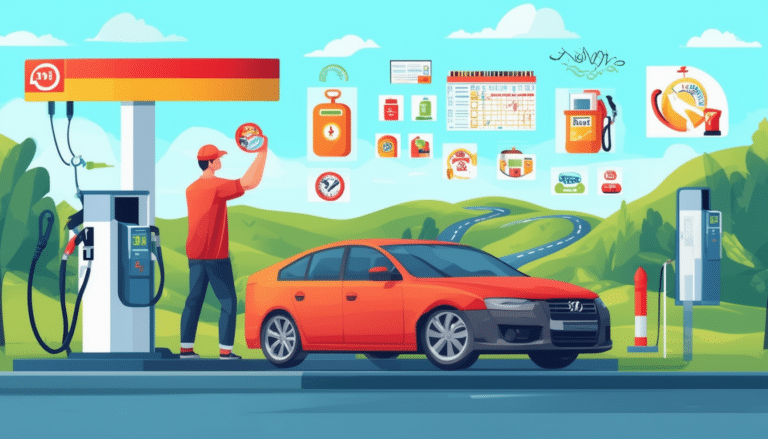Strategies Backed by Artificial Intelligence to Save Gasoline and Money
The constant increase in gasoline prices has generated growing concern among drivers, who are looking for ways to optimize their consumption and, at the same time, take care of their finances. In this context, artificial intelligence emerges as a valuable tool that allows the identification of effective strategies to save gasoline and money. These technological innovations offer practical solutions ranging from proper vehicle maintenance to intelligent route planning, thus transforming the way users manage their fuel consumption habits.
The constant rise in gasoline prices has led many drivers to seek effective ways to reduce their consumption and, consequently, their expenses. Fortunately, artificial intelligence has provided tools and recommendations that allow for optimizing fuel usage, thereby improving spending efficiency and contributing to a more sustainable economy. Below, several strategies supported by this technology are described that can help save gasoline and money at the same time.
Keep the vehicle in optimal condition
Artificial intelligence shows that regular maintenance of the vehicle not only prolongs its lifespan but also improves its fuel efficiency. Regularly checking tire pressure is crucial, as properly inflating them reduces resistance while rolling. Additionally, it is essential to change the oil, clean or replace air filters, and ensure that the spark plugs are in good condition. This not only optimizes engine performance but also helps to reduce fuel consumption.
Drive efficiently
A smooth and steady driving style is key to maximizing fuel efficiency. Avoiding sudden accelerations and harsh braking, as well as maintaining a consistent speed throughout the journey, reduces unnecessary gasoline consumption. Artificial intelligence also recommends using cruise control on highways, when possible, to help maintain a steady pace. Shifting gears at the right moments in manual vehicles is another aspect that can further optimize fuel use.
Reduce weight and improve aerodynamics
One of the most recommended methods is to remove unnecessary weight from the vehicle. Carrying roof racks or cargo boxes increases wind resistance, which in turn increases gasoline consumption. Artificial intelligence suggests it is advisable to remove all those heavy objects that are not necessary and are generally found in the trunk, which not only increases fuel efficiency but also improves the overall performance of the vehicle.
Plan routes
Route planning is essential to avoid traffic jams and optimize fuel use. Artificial intelligence proposes clustering tasks and errands into a single trip, which helps to avoid unnecessary trips and saves time. Using applications or GPS systems is an excellent option for planning routes with shortcuts that can reduce gasoline usage. In this way, more efficient transportation is achieved, both in terms of time and money.
Control the use of air conditioning and windows
Using the air conditioning properly can make a significant difference in fuel consumption. At low speeds, it is advisable to lower the windows instead of turning it on, as this reduces engine load. Conversely, at high speeds, it is best to keep the windows closed and use the air conditioning moderately to reduce wind resistance and, consequently, gasoline consumption.
Tips when refueling
- Turn off the engine before refueling.
- Check the side of the car where the fuel tank is located to avoid confusion.
- Know the type of gasoline your vehicle requires.
- Avoid using your mobile phone during the process.
- Do not smoke while refueling for greater safety.
- Learn how to properly open the fuel tank cap.
Benefits of saving gasoline in your car
-
Money savings: By optimizing gasoline consumption, the frequency with which the tank needs to be filled is reduced, leading to significant savings in the long run.
-
Lower maintenance costs: By taking care of gasoline, other components of the car, such as the engine and the injection system, are protected, reducing the likelihood of expensive repairs.
-
Reduction of pollutant emissions: Lower gasoline consumption also means fewer emissions of harmful gases, thus contributing to environmental preservation.
-
Smaller carbon footprint: By reducing the use of fossil fuels, one contributes to the fight against climate change.
Implementing these strategies backed by artificial intelligence not only translates into savings in gasoline expenses, but also favors environmental preservation by reducing the ecological impact. The combination of proper maintenance, efficient driving, and modern technology offers an accessible path towards a more sustainable and economical lifestyle.
The constant rise in the price of gasoline has led many drivers to seek practical solutions that allow them to optimize its use and, at the same time, save money. In this context, artificial intelligence has become a valuable tool by offering efficient and data-driven approaches to improve the fuel economy of vehicles.
Keeping the vehicle in proper condition is the first crucial step. AI recommends regular maintenance, which includes checking tire pressure, changing the oil, and cleaning air filters. All these factors contribute to greater fuel efficiency, as they reduce rolling resistance and optimize engine performance.
Furthermore, the way one drives has a significant impact on gasoline consumption. Efficient driving, which avoids harsh acceleration and maintains a constant speed, translates to a more sustainable use of fuel. The use of AI-based navigation systems can also help drivers plan routes more efficiently, avoiding traffic jams and reducing travel time.
Another important aspect is reducing the weight in the vehicle. Removing unnecessary items and avoiding roof racks helps improve aerodynamics and reduce wind resistance. It is also recommended to control the use of air conditioning and windows, adjusting their use according to speed to maximize fuel efficiency.
These approaches not only contribute to significant savings on gasoline expenses but also have a positive impact on the environment by reducing pollutant gas emissions. Adopting these practices backed by artificial intelligence is not only beneficial for your wallet but also for the future of the planet.






